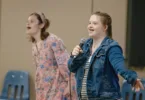
Major Curtis Nicholson, of the Kansas City Kansas Police Department, and his wife Michele, a budget analyst with the Wyandotte County Sheriff’s Department, are now on their way to entering the Catholic Church at the Easter Vigil. LEAVEN PHOTO BY JOE BOLLIG
by Joe Bollig
joe.bollig@theleaven.org
KANSAS CITY, Kan. — Sometimes people ask for a sign from God.
Sometimes they don’t — and they get one anyway.
Major Curtis Nicholson, of the Kansas City Kansas Police Department, received a sign that eventually put him and his wife Michele on the path to the Catholic Church.
For the Nicholsons, the first steps down that path began with heartbreak.
Curtis is a member of the department’s Criminal Investigations Division. Michele is a budget analyst with the Wyandotte County Sheriff’s Department.
The law enforcement community is like a big family. When one member is injured, the whole body feels the hurt.
This was especially so when Detective Brad Lancaster was shot and killed in May 2016, and Capt. Robert D. Melton was shot and killed in July 2016.
The Nicholsons knew both of the murdered officers. Curtis worked with Lancaster directly and he investigated both of the deaths.
“Shortly thereafter, I was driving down I-70 on a hunting trip,” said Curtis. “I saw this huge billboard, just as big as can be. It said: ‘Where will you spend ETERNITY?’
“I pretty much knew the answer,” he said, “and I didn’t like it.”
So, where did he think he’d spend eternity?
“In hell,” said Curtis. “I was never baptized or spent a day in church. I prayed on rare occasions.
“So, yeah, that’s what really propelled me to go forward.”
The climate of hate and violence directed toward the law enforcement community also played a role in their conversion, said Michele.
“Every day, it was another officer. . . . Like a big cloud of doom and gloom over us,” she said. “It was never-ending.”
Not only did the Nicholsons not go to church, they didn’t belong to one. Neither had ever been baptized and had only brief and incidental brushes with religion since they were children.
Curtis had occasionally thought about going to a church, but never actually followed through on it.
Now, things were different.
“I told Michele that I wanted to start going to church, and she was open to it,” said Curtis. “I decided that I wanted to look at the Catholic faith instead of others.”
Churchless by design
“I was exposed to church at a young age by some family friends, and went to church periodically,” said Curtis. “I’d been to summer church camps and Bible studies.”
His family, however, very rarely went to church.
“My parents were good parents, but they never led me to anything — to church or down a career path,” he said. “It was up to me to make decisions about what I wanted to do with my life.”
“It was the exact same for me,” said Michele. “I remember my mother saying that my father didn’t want to push any religion on us. He wanted us to make up our own minds when we got older.”
Occasionally, she joined friends on a Sunday School bus sent out by a Baptist church. Later, she tagged along with a school friend who would go to a nearby Catholic school to take religious education classes. She had relatives who were Protestant and her maternal grandmother may have been a lapsed Catholic.
The only time the Nicholsons went to church together was when they got married in a Nazarene church.
Why be Catholic?
The Nicholsons ended up on the path to the Catholic Church because of positive and negative church experiences.
On the negative side, the Nicholsons experienced cliquishness, rudeness and judgment at some Protestant churches they attended for one reason or another. At one place, a friendship was even ended when the Nicholsons declined to join that church.
“In my career I go to a lot of different churches for different functions,” said Curtis. “The other [non-Catholic] ones I’ve been to seem sometimes circus- like.
“It’s more of a show than getting closer to God,” he said. “It’s more fanfare and lots of wild and crazy music, and people dancing and running around on stage.”
“I’ve been to Catholic weddings and funerals on a few occasions,” he continued, “and I like the formalness. I’ve done some research and found that the Catholic faith was the founder of all the other [Christian] denominations.”
Curtis was also turned off by the idea that one can be “saved” by faith alone — that a single moment of being “saved” meant that whatever they did afterward didn’t matter.
“I wasn’t convinced by that,” he said. “Surely, that’s not really the case.”
On the positive side, Curtis heard a lot of good things about the Catholic Church from recent converts he worked with. They were excited to become Catholic.
Michele also saw positive examples of Catholicism from her Catholic co-workers, but she also was a little hesitant. Some people would say only negative things about the Catholic faith.
“I just wanted to go to a church where I could listen and learn, and nobody would come to my house to give me pamphlets,” she said. “When [Curtis] said [he wanted to join the Catholic Church], I was hesitant, but I kept an open mind.”
Curtis began to research the Catholic parishes in the metro area and found out about the Rite of Christian Initiation of Adults (RCIA). He deliberately chose to look a little beyond the town that employed them both.
“I wanted to see the best fit for us,” he said. “We wanted our church life to be separate from our work life. And in all the churches in Kansas City, Kansas, we know everybody. We wanted to meet a new group of people. That’s why we chose the church we did to go through the process, and are thankful that we did.”
He eventually landed on the program at Sacred Heart of Jesus in Shawnee and shared the news with Michele, asking her to attend classes with him.
“He just told me one day, ‘I’ve set up an appointment about getting into the program,’” said Michele. “I was a little surprised. I wasn’t sure if he was going to do it, for sure.
“I thought, ‘OK, it’s for real.’”
Welcome to the Catholic Church
So far, they’ve liked what they have found.
“People have been very welcoming,” said Michele.
For the first evening class, they had to stand up and tell about themselves.
“When we told everyone we were unbaptized and had never been to church, it was like, ‘Oh, wow.’ But not like, ‘Sinner, get out of here’ like we had experienced at other churches,” said Curtis. “Everyone is really excited for us.”
Learning about the Mass and “Catholic calisthenics” (sit, stand, kneel) are challenges. They’re also learning new words — like “homily,” “liturgy” and “Eucharist.”
“So, all the basic terminology they spoke of — we had no idea what those words meant, like acronyms in the military,” said Curtis. “It was like a new language.
“The big thing I love about the Catholic religion is you do have to learn why you’re in it. They want you to go to these classes and learn why you’re doing these things, whereas with other churches you walk in, do what you do, and you leave.”
Their lives are already changing.
“I’m lower-stress now and can deal with difficult people easier,” said Curtis. “I can deal with people better now.
“I know there are still evil people out there who do evil stuff, and my job is still to put them into prison and protect people, but [the Catholic faith] helps me deal with stress.”
Michele feels more forgiving and sympathetic for the people she sees and encounters.
“It’s been uplifting for me,” she said. “It feels like a weight off my shoulders. There’s something more out there than hatred and evil. It opened my eyes to good and see all the people who believe in God and practice their religion. It’s refreshing for me.”
Their sponsors and RCIA classmates have been very supportive.
“Everyone has been so accepting, and supportive of us, and helpful, and nonjudgmental,” said Curtis. “It’s just everything we could ask for.”






